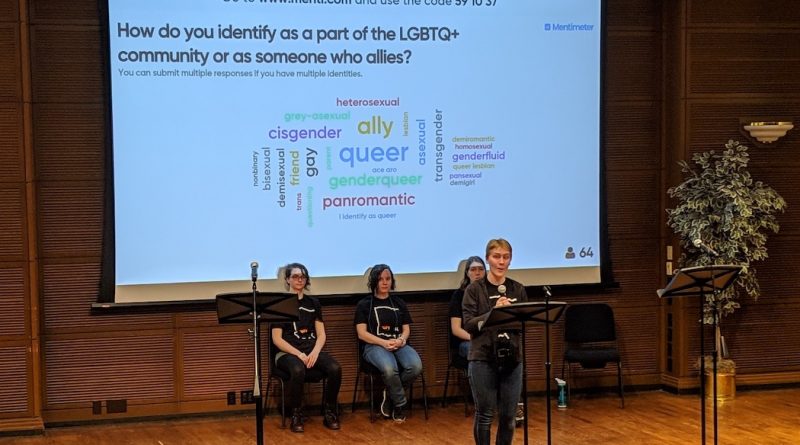One Student’s Perspective On Allyship At UD
Angela Weiland
Guest Columnist
Increasing and promoting allyship on UD’s campus really starts with the word itself– Ally. Using ally as a verb rather than a noun is an important first step towards understanding what it means to ally effectively. Participating in allyship is more than giving yourself the title of “ally.” Anyone can call themselves an ally but never back it up with action, which is problematic because it allows people the satisfaction of receiving a title without having to support it with actions. When ally is used as a verb it serves as more than a title that someone can declare and instead becomes a call to action. Using ally as a verb implies that action is required and therefore encourages people to concretely demonstrate how they ally rather than simply saying they do.

As a member of the LGBTQ+ community at the University of Dayton I have learned to greatly appreciate allyship. Knowing that people support the LGBTQ+ community has made it significantly easier for me to be out on campus. Coming to campus this fall I was unsure of what to expect in terms of allyship on campus and was delighted to find that many students and faculty members openly support the LGBTQ+ community. Being a practicing Catholic myself I understand how religion can impact ones view of the LGBTQ+ community and did not know how the University of Dayton would balance its Catholic affiliation with inclusivity. In my experience the university creates and fosters this balance well. I have been involved with groups such as Q*mmunity Leaders that focuses on educating the UD community about LGBTQ+ issues as well as Catholic Life which offers opportunities for retreats, service and religious-based discussion. I have found that I can be authentic in each of these environments without the fear of being ridiculed. In my opinion, this speaks to Dayton’s commitment to creating a loving and welcoming community of students.
Ally training plays an important role in fostering allyship on campus. Students are encouraged to participate in Ally Training in order to learn more about the LGBTQ+ community and ally more effectively. This training is open to anyone regardless of their identity within or outside the LGBTQ+ community. This is important to note because everyone has a responsibility to support and advocate for the marginalized around them whether or not they share an identity. In the same way that Caucasians should advocate for people of color and men should advocate for women’s rights so too should cisgender and heterosexual people advocate for members of the LGBTQ+ community. Even those within the community such as myself have an obligation to support those who identify differently than we do. For example, I am a white, cisgender woman however I can ally with transgender women of color. Allyship can go a long way in helping LGBTQ+ individuals feel included and appreciated within a community. I have been to Ally Training and seeing undergraduate students, graduate students, and faculty from UD attend the training was extremely uplifting. Knowing that people want to learn more about the LGBTQ+ community and support it is encouraging especially at a Catholic university. It shows me that my identity is accepted here and that I have a place on this campus.
Allyship has served an important role in my life. From friends who encouraged me to explore my identity to my parents’ understanding responses when I came out to them, allyship has made my journey in the LGBTQ+ community a comfortable and relatively easy one. Because I had people around me who allied with me I was able to embrace my lesbian identity and use it to better the experiences of other members within the LGBTQ+ community. During my senior year of high school, a group of my friends and I started a gay-straight alliance at our Catholic school, I am an active member of Q*mmunity Leaders here at UD and now I’m writing a news article about allyship. Because I was supported I am now able to support others. Being an ally does not mean attaining a title. It means speaking, standing and working with the LGBTQ+ community in order to move a step closer to a world in which every gender and sexuality is accepted and celebrated.
Photos courtesy of Angela Weiland.

